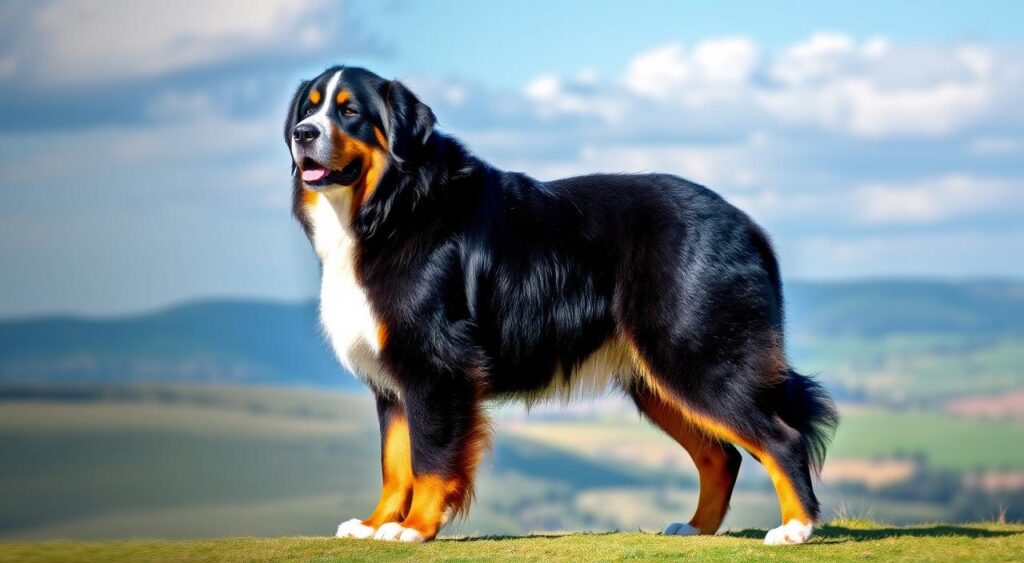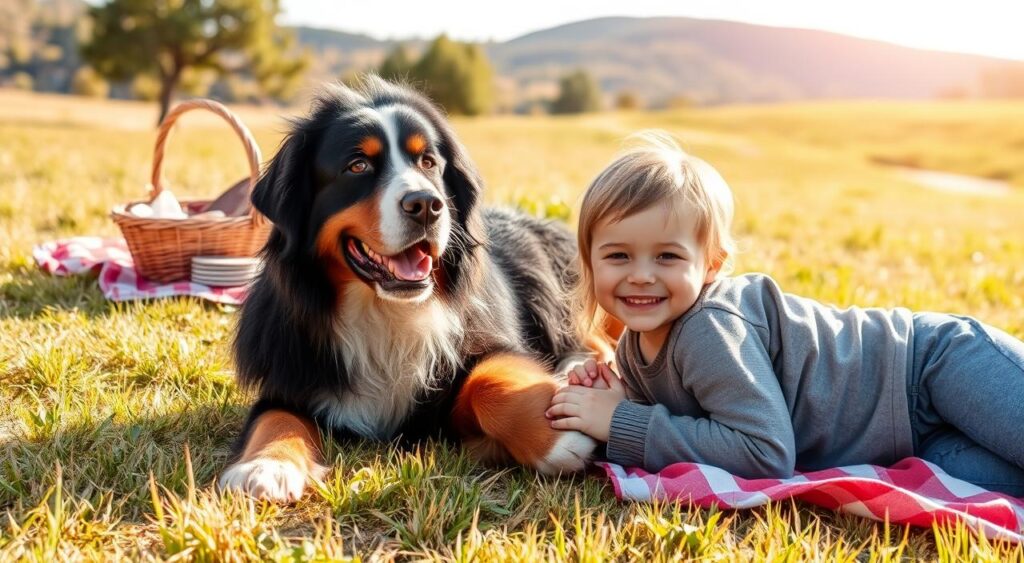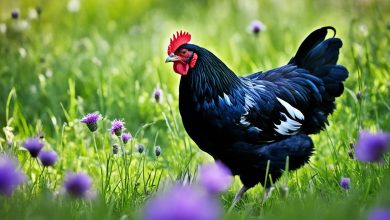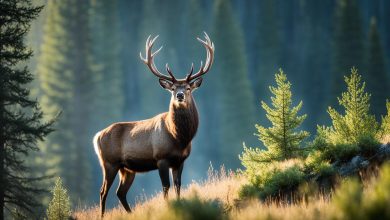Owning a Bernese Mountain Dog can cost around $20,000 over its lifetime. This figure shows the commitment needed for these gentle giants. These large dogs win hearts with their loyalty and affection.
Bernese Mountain Dogs stand up to 27 inches tall. They weigh between 70 to 115 pounds. Their size matches their devotion as family dogs.
These dogs have a striking tri-colored coat. They also have a calm demeanor. These traits make them beloved companions in many homes.
Despite their size, these dogs are gentle with children. They also get along well with other pets. Their intelligence makes them easy to train.
Bernese Mountain Dogs need 30 to 60 minutes of daily exercise. This activity keeps them healthy and happy. It also strengthens their bond with human companions.
With proper care, these loving dogs can bring joy for 7 to 10 years. They quickly become cherished family members due to their loyal nature.
Origins of the Bernese Mountain Dog
The Bernese Mountain Dog’s story began over 2,000 years ago in the Swiss Alps. Roman soldiers crossed the Alps with large black-and-tan dogs. These dogs, along with Mastiff-like breeds, formed the basis for today’s Bernese.
Swiss Alps Heritage
The Bernese Mountain Dog comes from the midland region near Bern, Switzerland. It’s one of four Sennenhund breeds, meaning “dairy farmer’s dog.” These dogs were bred for strength and endurance in the rugged Alpine terrain.

Working Dog Background
Bernese Mountain Dogs were originally working dogs on Swiss farms. They excelled at herding cattle and pulling carts loaded with goods. Their muscular build and tireless work ethic made them valuable to local farmers.
Transition to Family Companions
The American Kennel Club recognized the Bernese Mountain Dog in 1937. This led to increased popularity and a shift from working dogs to family pets. The Bernese Mountain Dog Club of America formed in 1968.
The club honors the breed’s working heritage through drafting and carting programs. These activities showcase the Bernese’s traditional skills and abilities.
| Characteristic | Male | Female |
|---|---|---|
| Height | 25-27.5 inches | 23-26 inches |
| Weight | 80-115 pounds | 70-95 pounds |
Bernese Mountain Dogs now rank 22nd in popularity according to the American Kennel Club. Their gentle nature and adaptability to family life have boosted their fame. Their photogenic qualities have also contributed to their rising popularity.
Physical Characteristics of Bernese Mountain Dogs

Bernese Mountain Dogs are impressive large breed dogs with a striking appearance. Their sturdy build reflects their history as working farm dogs in the Swiss Alps. These gentle giants have a muscular frame that allows for surprising agility and grace.
Male Berners typically measure 25 to 27.5 inches tall, while females stand 23 to 26 inches. Males weigh 80 to 115 pounds, and females 70 to 95 pounds. Their size makes them perfect for outdoor activities like hiking.
The breed’s most distinctive feature is its luxurious tricolor coat. A black base is accented with rust markings on the chest and legs. Crisp white appears on the chest, nose, tail tip, and feet.
This thick double coat sheds heavily twice a year. Regular grooming is necessary to maintain its lustrous appearance.
| Characteristic | Male | Female |
|---|---|---|
| Height | 25 – 27.5 inches | 23 – 26 inches |
| Weight | 80 – 115 pounds | 70 – 95 pounds |
| Coat Color | Black, rust, and white | |
| Build | Sturdy and muscular | |
Bernese Mountain Dogs have moderate exercise needs despite their robust appearance. They thrive with 30 minutes to an hour of daily activity. These dogs prefer exercising during cooler parts of the day.
Their physical attributes make them excellent family companions. They’re perfect for those who enjoy outdoor adventures and appreciate strong yet gentle dogs.
The Distinctive Tri-Color Coat
Bernese Mountain Dogs boast a stunning tri-color coat. Their rich black base is adorned with rust and white markings. The American Kennel Club recognized this breed in 1937.
Coat Color Patterns
The classic tri-color pattern includes black, rust, and white. Some Berners showcase a “Rusty Black” hue or an “Open-Faced” pattern. The rarest variation is the “White Marked” coat, featuring more white than usual.
Grooming Requirements
Bernese Mountain Dogs have a thick double coat requiring regular care. Weekly brushing prevents matting and manages shedding. Baths should be given as needed to maintain coat health.
During shedding seasons, daily brushing might be necessary. This helps control the increased fur fallout.
Shedding Habits
Berners shed heavily, especially during spring and fall. Their double coat insulates them in cold weather. Regular grooming helps manage shedding and keeps the coat healthy.
Many owners find grooming sessions a bonding experience. It’s a rewarding time despite the demands.
| Coat Type | Shedding Level | Grooming Frequency |
|---|---|---|
| Double Coat | High | Weekly (Daily during shedding seasons) |
Temperament and Personality Traits
Bernese Mountain Dogs are gentle giants with a steady-tempered nature. These loyal companions have a calm demeanor, making them perfect family pets. Their affectionate nature shines through in interactions with loved ones, especially children.
These dogs are intelligent and responsive to training, though sometimes stubborn. Their eagerness to please often outweighs any reluctance. They make wonderful partners in obedience exercises.

Bernese Mountain Dogs thrive on family activities and bond deeply with their humans. Their patience and tolerance make them excellent playmates for kids. Early socialization is key to nurturing a well-rounded temperament.
| Trait | Description |
|---|---|
| Temperament | Aloof, friendly, gentle, playful |
| Intelligence | High |
| Energy Level | Calm |
| Exercise Needs | Medium |
Most Bernese Mountain Dogs are peaceful with other animals. However, some males may show aggression towards other male dogs. Their size varies, with some being athletic and others more ponderous.
These gentle giants excel in cold climates. They enjoy activities like cart pulling in cool weather.
Bernese Mountain Dogs as Family Pets
Bernese Mountain Dogs make excellent family pets. They blend gentle nature with protective instincts. These large, lovable dogs adapt well to various homes, perfect for families of all sizes.
Interactions with Children
Bernese Mountain Dogs excel in homes with kids. Their calm demeanor and size make them sturdy playmates for children. These dogs often form strong bonds with young family members, watching over them with gentle care.
Compatibility with Other Pets
Bernese Mountain Dogs usually get along well with other animals. Their easy-going nature allows for smooth introductions to existing pets. With proper socialization, they can live harmoniously with other dogs and cats.
Adaptability to Home Environments
Bernese Mountain Dogs adapt surprisingly well to different living spaces. They thrive in homes with yards but can adjust to apartment living. These family dogs prefer to be close to their owners.
They don’t do well when left alone for long periods. Regular exercise is crucial for their well-being in any living situation.

| Trait | Description |
|---|---|
| Size | 23-27.5 inches tall, 70-115 pounds |
| Exercise Needs | At least 30 minutes daily |
| Temperament | Gentle, patient, protective |
| Child-Friendly | Excellent with children |
| Pet Compatibility | Good with other pets when socialized |
Training and Socialization Needs
Bernese Mountain Dogs benefit from early socialization and training. These gentle giants need structured obedience training for good manners. Positive reinforcement works best for these sensitive pups.
Puppy kindergarten classes are great for socializing young Berners. They expose puppies to different people, dogs, and environments. Introducing them to various surfaces and objects helps their development.
Breeders often start crate training to ease the move to new homes. Clear communication is vital when training Bernese Mountain Dogs. They rely on non-verbal cues, so clear body language is crucial.
- Start training early
- Use positive reinforcement
- Attend puppy socialization classes
- Expose to various environments
- Practice consistent obedience training
Breeders play a key role in a Berner’s early growth. They often help new owners with training and socialization tips. This support can prevent behavior issues from lack of proper training.
Patience and consistency are crucial when training Bernese Mountain Dogs. With proper care, these lovable giants can become well-mannered family companions.
Exercise Requirements for Bernese Mountain Dogs
Bernese Mountain Dogs thrive with ample exercise. These gentle giants need 1 to 1.5 hours of daily activity. Regular exercise helps prevent obesity and arthritis.
Daily Activity Recommendations
Adult Berners need two 15 to 30-minute off-leash play sessions daily. Several on-leash walks are also beneficial. Avoid exercising them right after meals to prevent bloat.
Puppies grow slowly and shouldn’t overexert themselves. Tailor their exercise routine to their age and energy levels.
Mental Stimulation Importance
Mental exercise is crucial for Bernese Mountain Dogs. Puzzle toys and training engage their intelligence. These activities contribute to a well-rounded, content pet.
Outdoor Activities Suitable for Berners
Bernese Mountain Dogs enjoy various outdoor activities. Cart pulling, hiking, swimming, and fetch are great options. Be cautious in hot weather due to their thick double coats.
Always monitor their comfort level during outdoor adventures. Adjust activities based on their individual needs and preferences.
- Daily walks
- Doggy playdates
- Hiking trips
- Swimming sessions
- Fetch games
Some Berners may need more exercise than others. Tailor their routine to their specific needs. Proper physical and mental stimulation leads to a happier, healthier dog.
Health Concerns and Lifespan
Bernese Mountain Dogs have breed-specific health issues owners should know about. These gentle giants typically live 7 to 10 years. Females often outlive males by about a year.
Their size, 23 to 27.5 inches tall and 70 to 115 pounds, adds to health challenges. Common health problems include:
- Hip and elbow dysplasia
- Gastric Dilatation-Volvulus (GDV or bloat)
- Cancer, particularly histiocytic sarcoma
- Progressive retinal atrophy
- Degenerative joint disease
- Spinal disorders
Cancer is a major concern, causing over 58% of deaths in this breed. Regular vet check-ups, including chest x-rays and eye exams, help detect problems early.
Owners can manage health issues through preventative care. This includes proper diet, regular exercise, and routine vet visits. Some dogs may benefit from omega-3 supplements, as advised by vets.
| Health Issue | Prevalence | Prevention/Management |
|---|---|---|
| Cancer | 58.3% | Regular check-ups, early detection |
| Joint Disease | 4.2% | Weight management, appropriate exercise |
| Spinal Disorders | 3.4% | Proper nutrition, avoiding obesity |
| Renal Injury | 3.1% | Balanced diet, regular vet visits |
Understanding these health risks is crucial for Bernese Mountain Dog owners. Taking proactive steps can help these dogs live healthier lives.
Nutrition and Feeding Guidelines
Proper nutrition is vital for Bernese Mountain Dogs’ health. These gentle giants have unique dietary needs. Their requirements change as they grow from puppies to adults and seniors.
Dietary Needs at Different Life Stages
Bernese Mountain Dog puppies need 3-4 meals daily. At about 6 months, they can switch to twice-daily feeding. Adult Berners usually keep this schedule.
Senior dogs may need dietary changes to meet their evolving nutritional needs.
Portion Control and Weight Management
Weight management is crucial for Bernese Mountain Dogs. These large breeds can easily become overweight. Obesity can lead to health problems.
Portion control is key. High-quality dog food with balanced nutrients supports their needs. Ask a vet about the right calorie intake for your dog.
Recommended Feeding Schedule
A regular feeding schedule helps maintain good digestion. Adult Berners typically eat twice a day. Always provide fresh water.
Some owners choose raw diets, while others prefer quality kibble with supplements. Either way, ensure it meets your dog’s nutritional needs.
| Age | Feeding Frequency | Diet Type |
|---|---|---|
| Puppy (2-6 months) | 3-4 times daily | Puppy-specific food |
| Adult (6 months+) | 2 times daily | Adult dog food |
| Senior | 2 times daily | Senior-specific or vet-recommended diet |
Bernese Mountain Dog Breed Standards
Bernese Mountain Dog breed standards define their unique traits. The American Kennel Club (AKC) provides guidelines for size, coat, and temperament. These standards help preserve the breed’s special qualities and working abilities.
AKC standards state male Bernese Mountain Dogs should be 25 to 27.5 inches tall. Females should measure 23 to 26 inches. Their tri-colored coat is a key feature in shows.
The ideal coat has a jet-black base with rust and white markings. Symmetry in these markings is highly desirable. Physical structure is crucial for the dog’s working abilities.
Straight, strong legs and moderate hindquarter angulation are important. These features contribute to the breed’s natural working gait. The Bernese Mountain Dog should be self-confident, attentive, and good-natured.
| Characteristic | Standard |
|---|---|
| Male Height | 25 – 27.5 inches |
| Female Height | 23 – 26 inches |
| Coat Color | Tri-color: Black, Rust, White |
| Temperament | Self-confident, Attentive, Good-natured |
Breed standards are vital for maintaining Bernese Mountain Dogs’ unique features. They guide breeders and judges in conformation shows. This ensures the breed’s continued excellence and preservation.
Adopting vs. Buying a Bernese Mountain Dog
Bernese Mountain Dogs are gentle giants ranking 27th among 189 AKC breeds. You can adopt or buy from a breeder. Rescue organizations often have Bernese Mountain Dogs available for adoption.
Responsible breeding is crucial when buying a Bernese Mountain Dog puppy. In the Northeast U.S., expect to pay $3,000 to $3,500. Good breeders provide health certifications and follow strict practices.
They don’t sell puppies online and often have waiting lists. The Bernese Mountain Dog Club of America website can help you find reputable breeders.
Understanding the breed’s needs is essential. Bernese Mountain Dogs live 6 to 8 years on average. They’re prone to certain health issues.
The Berner-Garde Foundation database can help you make an informed decision. AKC registration alone doesn’t guarantee a healthy dog. Research thoroughly to find your perfect Bernese Mountain Dog.
FAQ
What is the origin of the Bernese Mountain Dog?
Bernese Mountain Dogs come from the Swiss Alps. They were bred as working dogs for herding cattle and pulling carts on farms. Their strong build suited the rugged Alpine terrain well.
What is the typical size and weight of a Bernese Mountain Dog?
Male Bernese Mountain Dogs stand 25-27.5 inches tall and weigh 80-115 pounds. Females are 23-26 inches tall and weigh 70-95 pounds. They have a large, sturdy build with a muscular frame.
What is the coat of a Bernese Mountain Dog like?
Bernese Mountain Dogs have a tri-colored coat with deep black as the main color. White and rust markings accent their coat. They have a thick, silky double coat that needs regular grooming.
What is the temperament of a Bernese Mountain Dog?
Bernese Mountain Dogs are gentle, affectionate, and calm. They’re smart, eager to please, and easy to train. These dogs form deep bonds with their families and love being close to them.
Are Bernese Mountain Dogs good with children and other pets?
Yes, Bernese Mountain Dogs are great family pets. They’re gentle and patient with children. When properly introduced, they often live well with other dogs and cats.
What are the exercise requirements for Bernese Mountain Dogs?
Bernese Mountain Dogs need 30-60 minutes of moderate exercise daily. This can include walking, hiking, and playing fetch. They also enjoy mental challenges like training and puzzle toys.
What are some common health concerns for Bernese Mountain Dogs?
Bernese Mountain Dogs may face health issues like hip and elbow dysplasia. They can also develop cancer, bloat, and progressive retinal atrophy. Regular vet check-ups and preventative care are important.
What are the nutritional needs of Bernese Mountain Dogs?
Bernese Mountain Dogs need a balanced diet for their life stage. Their food should have the right mix of protein, fat, and carbs. Portion control is key to prevent obesity.




